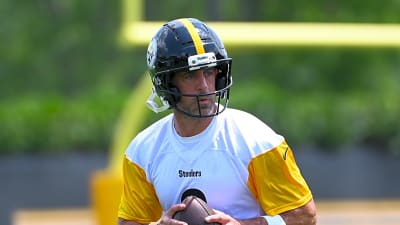Let's face it, college sports in its current state is here to stay, but there are some things that need to be tinkered with.
The main issue with most fans is NIL particularly is ruining everything about amateur athletics. That's certainly not the case because the best players have been getting paid for generations with the majority of them not getting caught.
While the latest presidential executive order came to save the day, it won't reinstall the default version of College Sports 1.0 to what we knew it as in 2020. So much has changed over the course of four years that only restrictions can reshape the current landscape in order to calm things down.
It's chaotic. It's the Wild West out there. Athletes become discontent about their current situation which leads to them contacting agents or family members about finding a way out.
Maybe there's an athlete that starts to turn heads in college after being underrecruited as a high schooler just to leave his small school for opportunities at the FBS level.
Agents leak names to athletic departments which causes coaches to tamper in return without any consequences to the program that signs them because the NCAA sits in a UFC ring without any legs and both arms tied behind its back.
It's gotten so far out of control that there is no way to rein it back unless guidelines are put in place by leaders with actual spines.
The new house settlement put roster limits for scholarship and number of walk-on opportunities. With the transfer portal still in place, teams are hitting the pause button on freshmen while giving those opportunities to athletes with sometimes three or more years under their belt instead which is something Arkansas coach John Calipari wants changed.
"We've got to get our arms around [the transfer portal]," Calipari said on CBS Sports' Inside College Basketball Show. "How about this? A kid stays in school four years, four different schools. Does he graduate? 'No.' Is there any chance that he can graduate? 'Slim.'
"Okay, so now he has to go get a job without a college degree, and someone offers him $55,000 $60,000 [per year]. What does he say? 'Are you crazy? I was getting this, that and the other. Do I have to come into work. Do I get a car? Are you paying for my apartment?' I mean, you're talking about mental health issues we're developing because we won't get our arms around it."
Calipari tells CBS Sports that he has a proposition for the NCAA that an athlete should have freedom to transfer one time, but after that they must sit out a year should they leave for a second time.
"Very simple, you should have a free year after you stay in school for one year, you gotta stay there one year and play. You can't just sit out," Calipari said. "So you play one year where and then if you choose to transfer, you get it one time.
"So either you made a mistake, the coach wasn't honest with you, there was a guy on the team that was better than you thought, and you're going to be behind him and Bubba, I get it, but after that, you sit out. Five years to play four."
One of Calipari's top calling cards as a coach is his ability to sign elite incoming freshman going back to his days at Memphis with guys such as Derrick Rose, a former NBA MVP. Due to the inception of the transfer portal, things have gone awry as freshmen aren't given the same opportunities they were just a handful of years ago.
"We're getting away from freshman recruiting." Calipari said. "There are 1000 United States of America freshman who aren't being recruited because everybody's saying 'I'm going to take an older kid. Why would I use my revenue share on an 18 year old, or 17 year old, when I don't know if he can help?'
"Is that what we want? So being fair for the kids, you can transfer once without penalty, but because we care, we want you to graduate. If you're going to transfer after that, you sit out, you have five years to play four. How about this? If you stay four years at one school, we'll give you a fifth year. And so now we can wrap our arms around that 70% of our issues get solved by that."
It's certainly not rocket science to figure out a way to put an end to the chaos and uncertainty that college sports has become. Even the average fan can bring upon great points via social media on how to fix these concerns, but it's all about money, not feelings, not the mental or emotional health after athletes enter the professional world.
"The money is what it is. I always say kids deserve the money, but the way we're doing this, we're hurting, not helping kids," Calipari said. "They should be able to transfer at any point. One time, but I'll throw this one. Coach leaves right now. You have 30 days to leave. That should stay the same."
One major issue that Calipari wants to rid the college athletics of is tampering, whether it's due to other coaches, agents and even other athletes. The only way these things go away is if the adults in the room pull up their big boy britches in order to implement much needed changes.
"How about tampering that goes away? How about the extortion that goes away," Calipari asked. "I mean, who does this fall on the transfer stuff? Does it fall on the college president?"
It all collectively falls on the coaches who need to be advocates for their players' well being and for what's best for athletes or are still considered impressionable young adults.
[The infrastructure] falls on the coaches, and that's why this is the last thing we're dealing with," Calipari said. "This doesn't fall on the athletic director, doesn't fall on the president, the Board of Trustees. This falls directly on the coach.'
"We need to deal with that. And this thing could, we could go on, I just want this to be right for my son [Brad]. My son's 29 years old, right? He's coaching. He wants to be in this. Well, let's get this thing where it's in some kind of working order."
HOGS FEED:
More must-reads:
- NFL insider reveals new info on Cowboys-Micah Parsons struggle
- Tottenham Hotspur star announces unexpected departure
- The '250-strikeout MLB seasons' quiz
Breaking News
Trending News
Customize Your Newsletter
 +
+
Get the latest news and rumors, customized to your favorite sports and teams. Emailed daily. Always free!








